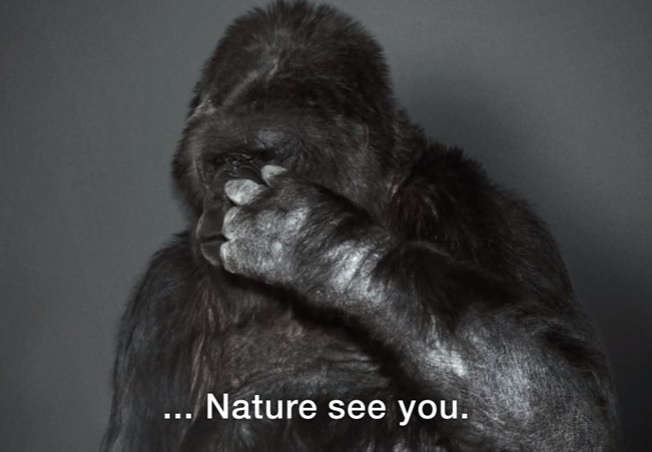
The recent murder of a gorilla at the Cincinnati Zoo reminds us just how little respect we have for non-human animal life. Videos of the incident show very clearly that, when a three-year-old boy fell into the cage of Harambe the Gorilla, Harambe made an effort to protect him. Hysterical screams from the crowd seemed to scare Harambe, who panicked and was quickly shot dead by a Zoo worker.
The knee-jerk shooting, the fact that non-lethal methods were not used, the fact that the crowd reacted with panic assuming that the gorilla would hurt the boy, the fact that this sentient being was imprisoned for life to be gawked at by humans as a thing—all of this is indicative of the profound disrespect, incomprehension and disconnection humans of this global society have with regard to even our nearest non-human relatives.
We quite literally “dehumanize” beings like Harambe—imagining ourselves in self-congratulatory dichotomy to them, ignoring our similarities and assuming differences that don’t exist. Emotion? Problem solving? Tool making? Language? Gorillas and other animals have shown amply-documented capacity for all of these things and more—and is it really any wonder, considering how closely related we are?
This failure to recognize ourselves in even the parts of nature that resemble us most is just one sign of a deep sickness in the contemporary human soul. It reminds us just how deeply we have lost touch with our surroundings and ourselves. This sickness is part and parcel of our wholesale destruction of the living earth that surrounds and sustains us—as if we were not entirely dependent on its survival for our own.
The sad story of Harambe also recalls another recent story: that of the video that went viral a few months ago of Koko the Gorilla. Koko is a 44-year-old female gorilla living in California who understands more than 2,000 words of spoken English and 1,000 signs of a modified version of American Sign Language (ASL) called “Gorilla Sign Language” (GSL).
Some challenged the video’s authenticity. While it’s true that the video was edited and could be verified through an analysis of the uncut version and context, what’s more interesting is that the very denial that Koko would be incapable of formulating such a sophisticated message was itself part of the very problem Koko’s message addressed. Our contemporary global society, rooted in centuries of violent European expansion, exploitation and extraction of natural resources has as one of its fundamental axioms the separation of humanity from nature.
While in many of the cultures Europeans colonized, “civilized” and destroyed, humanity was regarded as part of a family of living beings, often linked to particular animals, plants or ecosystems in profound ways. The ascendant paradigm, however, sought to separate humans from animals, mind from body, spirit from instinct, and “civilization” from “savagery.”
The true savagery with which indigenous cultures across the globe were repressed, dismissed and obliterated was paralleled by war on the feminine, on sexuality, on nature worship in all its forms, and increasingly, on death. The cult of “progress,” of the machine, of money and the invented economy, are all part of a cultural fascination with the artificial that is culminating in the virtualization of our lives. We worry about unemployment as the ocean acidifies, coral bleaches and marine life dies. We worry about GNP growth, as CO2 and CH4 emissions rise at record rates and global average temperatures with them. Like a pedestrian on their smartphone, our attention is entirely sucked up into the man-made, the virtual, the illusory, even as we ignore the physical reality around us, including the oncoming car of the destruction we have wrought.
Whether Koko’s message turns out to be authentic, it bears a striking resemblance to other messages that have been coming to us from indigenous people around the world. I can remember an Australian Aborigine saying many years ago: “You Westerners think you’re you’re so smart, but look what you’ve done. You’re killing the planet and you’re going to kill us all.” Black Elk, Hampate Bâ, and other non-Westerners who experienced the arrival of Western colonization made similar observations. Like Koko, these people have not forgotten our true relationship to nature. While “religion” for many of us today evokes the reading of written texts while inside stone structures—completely focused on and surrounded by, in other words, the objects of our own creation—Indigenous religions tend to involve direct personal experience of nature, both within and without. This is also true of Europe, where the Gothic Cathedrals were preceded by the sacred groves of the Germans, Celts and Norse. Before the fetishism of “Civilization” was the reverence for nature.
The need to feel separate, special, exempt, and in control that expresses itself in so many ways in our culture is nothing short of pathological––as anything from a state-of-the-art slaughter house to the Kurtzweillian vision of human immortality via a “singularity” can easily remind us. And it is this very pathology—the delusional separation of ourselves from trees, gorillas and indigenous societies that still maintain and honor their connection with nature—is the planetary blight that is now so rapidly killing the earth, at least as a viable habitat for humans, as, bewitched by false certainty, we continue to saw off the limb on which we sit.
Whether or not Koko’s message turns out to be authentic, the secret it divulges could not be more true: we are nature. We are a subset of nature, an epiphenomenon of the earth. Earth is our mother—not in the sense that a child has a mother, but in the sense that a fetus has a mother: we appear within Her, we are made of Her, we are utterly dependent upon Her. The earth is calling out to us now in many ways, and more of us are hearing her every day. The struggle for our spiritual and physical survival are one. Now it is our duty—our single overriding responsibility—to arise from the madness and rediscover ourselves as part of our environment.
The situation that centuries of collective unconsciousness have created could not be more dire, but if each one of us can awaken to our true calling as agents of the earth, nothing will be impossible.
~
Author: Peter Cohen
Photo: Video Still
Editor: Travis May






Read 0 comments and reply